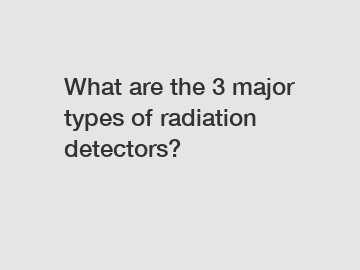What are the 3 major types of radiation detectors?
Radiation detection is an important aspect of various industries, including healthcare, nuclear power, and environmental monitoring. Understanding the three major types of radiation detectors is crucial for maintaining safety standards and ensuring proper handling of radioactive materials. In this article, we will explore the three major types of radiation detectors and their unique features.
**Ionization Chamber**.
Ionization chambers are one of the most common types of radiation detectors used in various applications. These detectors work by measuring the electrical charge produced by ionizing radiation as it passes through a gas-filled chamber. When radiation interacts with the gas molecules in the chamber, it creates positively and negatively charged ions. The ion pairs generated during this process create an electrical current, which is proportional to the amount of radiation present.

Ionization chambers are known for their high sensitivity and ability to measure a wide range of radiation levels. They are commonly used in medical imaging, radiation therapy, and environmental monitoring. However, ionization chambers have limitations when it comes to detecting specific types of radiation, such as alpha particles, due to their low penetrating power.
**Geiger-Muller Counter**.
The Geiger-Muller counter is another popular type of radiation detector that is widely used in various industries. This detector operates by detecting the ionization created by incoming radiation in a gas-filled tube. Unlike ionization chambers, Geiger-Muller counters are more sensitive to low levels of radiation and can detect alpha, beta, and gamma radiation.
One of the key features of Geiger-Muller counters is their ability to provide instant results, making them ideal for radiation surveying and monitoring. These detectors produce an audible click or visual signal for each radiation event detected, allowing users to quickly identify areas of high radiation levels. However, Geiger-Muller counters have limitations when it comes to measuring high radiation levels accurately, as they can become saturated at high radiation doses.
**Scintillation Detector**.
Scintillation detectors are specialized radiation detectors that use scintillating materials to detect ionizing radiation. These detectors work by converting the energy of incoming radiation into pulses of light, which are then detected and measured by a photomultiplier tube. Scintillation detectors are highly sensitive and can detect various types of radiation, including alpha, beta, and gamma radiation.
One of the main advantages of scintillation detectors is their ability to provide energy information about the detected radiation, allowing for more precise measurements. These detectors are commonly used in nuclear medicine, environmental monitoring, and homeland security. However, scintillation detectors can be more expensive and require sophisticated equipment for operation compared to ionization chambers and Geiger-Muller counters.
In conclusion, understanding the three major types of radiation detectors is essential for ensuring the safety and efficiency of various industries that deal with radioactive materials. Ionization chambers, Geiger-Muller counters, and scintillation detectors each have unique features and applications that make them suitable for specific tasks. By choosing the right type of radiation detector based on the requirements of the application, users can ensure accurate and reliable measurements of radiation levels.
If you have any questions or would like to learn more about radiation detectors, please feel free to contact us.
For more introduction to radiation detectors, acousto-optic q-switch driver, master oscillator power amplifierinformation, please contact us. We will provide professional answers.
164
0
0

Comments
All Comments (0)